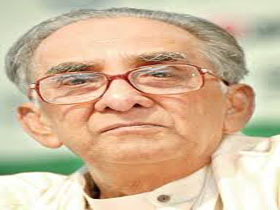Former chief justice and caretaker government chief Muhammad Habibur Rahman passed away at city’s United Hospital on Saturday night. He was 85.
Sources at the hospital said Habibur Rahman, who was the chief adviser of the 1996 caretaker government which oversaw the country’s seventh parliamentary elections, was declared dead at 9.53 pm.
They said Habibur Rahman perhaps had died before he was taken to the hospital.
His wife Islama Rahman told reporters that the ex-chief justice was fine all day long and had an informal meeting with some guests at his home from 8pm to 8:15pm.
Then he returned to his room and was listening to BBC news before he fell ill. Their housemaid found him lying on the floor around 8:50pm.
He was rushed to the hospital where doctors declared him dead around 9:53 pm after various examinations for nearly 30 minutes.
Habibur Rahman is survived by wife, three daughters and a host of relatives and well-wishers to mourn his death.
He had been living in his house No 124 at Gulshan-1 with his wife, elder daughter, Rubaba Rahman, and two domestic-helps. His two other daughters –Nusrat Habib and Raonak Shirin — live in the USA.
The ex-chief justice’s brother-in-law Ali Iftiar Chowdhury said Habibur Rahman’s body will remain at the mortuary of the United Hospital until his second daughter, Nusrat Habib, arrives here on Monday morning.
Iftiar said they have primarily decided to bury him at Banani Graveyard.
His mortal remains will be kept at Central Shaheed Minar for two hours from 10am to 12pm on Monday to enable people from all walks of life to pay their last respect to the former chief justice.
Supreme Court Registrar AKM Shamsul Islam told UNB that the namje-janaza of the ex-caretaker government chief will be held at 1 pm on Monday on the Supreme Court premises.
Meanwhile, President Abdul Hamid and Prime Minister Sheikh Hasina expressed deep shock at the death of Habibur Rahman and conveyed their deep sympathies to his bereaved family members.
Recalling the contributions of Habibur Rahman to the country’s judiciary, Sheikh Hasina said the former chief justice had played a strong role in establishing democracy and its march forward in the country.
BNP Chairperson Khaleda Zia also condoled the death Habibur Rahman and conveyed her profound sympathy to his family members. Finance Minister AMA Muhith also expressed his deep at Habibur Rahman’s death.
Awami League leader Tofail Ahmed, Chairman of the National Human Rights Commission Dr Mizanur Rahman and many of his well-wishers visited the hospital to pay their last respect to Habibur Rahman.
Born in India’s Murshidabad in 1930, Habibur Rahman obtained his BA Honours in 1949 and MA 1951 in History from Dhaka University and subsequently, BA Honours in 1958 and MA in 1962 in Modern History from the Oxford University.
According to Banglapedia, Habibur Rahman began his career as a lecturer in History of Dhaka University in 1952. Later, he joined Rajshahi University where he subsequently held the office of Dean of the Faculty of Law (1961) and of Reader in History (1962-64).
Habibur Rahman changed his profession in 1964 when he switched over to law and joined the Dhaka High Court Bar. In his legal career, he held the offices of Assistant Advocate General (1969), Vice President of High Court Bar Association (1972) and member of Bangladesh Bar Council (1972).
He served as a Judge of the High Court Division (1976-85), Judge of the Appellate Division of the Supreme Court (1985-95), Acting Chief Justice (1990-91) and as chief justice of Bangladesh (1995). His juristic competence is demonstrated in his opinions and interpretations as pronounced in many of the Bangladesh Supreme Court’s decisions concerning vital issues, such as, admiralty jurisdiction, amendment of the Constitution, citizenship, habeas corpus, administrative tribunals and court jurisdictions.
Habibur Rahman retired from service as Chief Justice of Bangladesh in 1995.
A researcher and writer Habibur Rahman has substantial contribution to literature and in varied intellectual arena.
Some of his literary and other noted publications are as follows: Law of Requisition (1966), Rabindra Prabandhey Sanjna O Parthakya Bichar (1968), Jatha-sabda (1974), Matri-bhashar Sapakshey Rabindranath (1983), Quran-sutra (1984), Bachan O Prabachan (1985), Gangariddhi thekey Bangladesh (1985), Rabindra Rachanar Rabindra-byaksha (1986), Rabindra-kabyey Art, Sangeet O Sahitya (1986), On Rights and Remedies, Amara ki Jabo-na Tader Kachhey Jara Shudhu Banglai Katha Baley (1996). Justice Rahman was awarded Bangla Academy Award for Literature in 1985.
Habibur Rahman was a Fellow of Bangla Academy and Asiatic Society of Bangladesh; Honorary Fellow of Worcester College, Oxford; and also Honorary Bencher of Honourable Society of Lincoln’s Inn, London.
Source: UNBConnect










